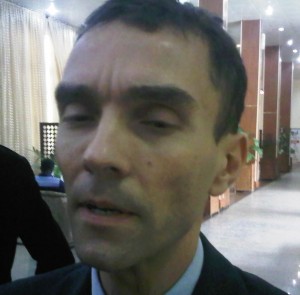
In the light of the challenges posed by climate change and environmental degradation to the attainment of the Millennium Development Goals (MDGs) and national implementation of Vision 20:2020, experts and key government officials have taken up a campaign to integrate climate change/environmental concerns into the nation’s development agenda, particularly the second National Implementation Plan (NIP-2).
The initiative was the outcome of a two-day gathering in Abuja on “Focused Meeting to Mainstream Climate Change/Environment Issues into National Implementation Plan (NIP-2) of the Nigeria Vision 2020” organised by the Department of Climate Change (DCC) of the Federal Ministry of Environment (FME) in collaboration with National Planning Commission (NPC) and the United Nations Development Programme (UNDP).
UNDP Deputy Country Director for Programmes, Bernardo Cocco, disclosed that the meeting was designed to complement on-going efforts to develop institutional capacities at all levels of government, in order to effectively position Nigeria to benefit enormously from the global shift towards green economy and sustainable development.
He added that the benefits would not only include reduced risks and vulnerability, prevention of policy duplications and enhanced efficiency, but would eventually result in the leveraging of greater finances for tackling the negative consequences of climate change to development gains in Nigeria.
Cocco said that the ultimate objective of this process on the long run is to improve adaptive capacity, create an enabling policy environment and institutionalise the framework for continued budget support for tackling these issues.
Permanent Secretary in the FME, Rabi Jimeta, who declared the meeting open, said the issue of climate change is no more in doubt as, over the years, the implication of climate change on development process has increasingly influenced economic performance and livelihood with cascading effects in human health and key sectors of the economy.
According to her, Nigeria is currently experiencing climate conditions with adverse impacts on the welfare of millions of its population. These include incidences of persistent droughts and flooding, off-season rains, drying lakes and increasing desertification as well as considerable reduction in river flow in the arid and semi-arid regions of the country.
“Northern Nigeria is becoming drier, while the Southern part is getting wetter, increasing incidences of disease, declining agricultural productivity, and rising incidences of heat waves. People in the coastal areas who used to depend on fishing have seen their livelihoods destroyed by the rising waters,” she said.
Represented by the Director, DCC, Samuel Adejuwon, she noted that it is important to manage climate change risks as part of our development approach, integrating climate change as a cross cutting issue in development plans will protect hard won advances made to date and to be made in the future in reducing national poverty. Such an integrated approach will make development more resilient by reducing climate impacts and identifying development opportunities in Nigeria.
Jimeta stressed that mainstreaming climate change/ environmental issues into NIP-2 of the Nigeria Vision 2020-20 would help to address the looming negative impacts of climate change and turn the challenges into opportunities for national sustainable and low carbon development path.
Similarly, the implementation of climate change activities therefore needs to be taken more seriously towards achieving Nigeria’s national development plan, transformational agenda and fulfilling Nigeria’s obligations to both the United Nations Framework Convention on Climate Change (UNFCCC) and the Kyoto Protocol.
NPC Director, Social Development, George Nwalupue, said the meeting provides an opportunity for stakeholders to harvest inputs for incorporation into the proposed NIP-2 of the Nigeria Vision (NV20: 2020). He added that the meeting came up at the right time, when climate change and environmental issues and their attendant consequences are now in the front burner.
He noted that for national development to be sustainable, it is imperative to conceptualise the environment as a cross cutting development issue and to ensure that environment resources are properly valued and accounted for in the development process.
